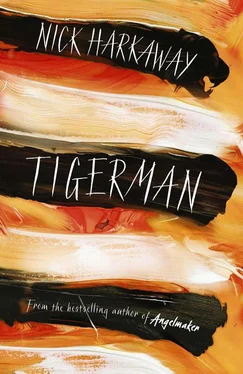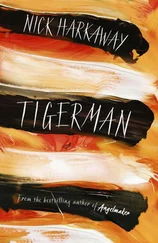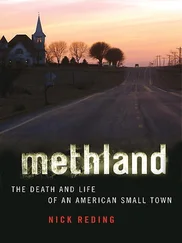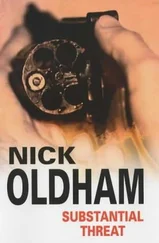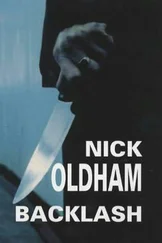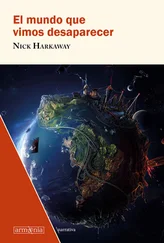Laughter rolled down the tunnel. They were early, he gathered, preparing the ground. The guests would arrive later. Girls, he assumed, and maybe some other soldiers. Plenty of people to spread the story of what happened here, to witness the moral caning which was about to be handed out.
At his belt, in true hero style, hung a small selection of oddments: a strange collection of tools the boy had added of his own initiative which must seem useful to a reader of comics — climbing gear, a compressed-air siren, some fisherman’s glowsticks. What possible use was a compass? Or a device for seeing off predatory fish? Holy Shark Repellent, Batman! As for the siren, it was a civilian thing for summoning aid if you were being mugged. He imagined himself using it to call for help, and trying to explain his outfit. Loony Lester.
Alongside this bric-a-brac, though, were two smoke grenades of a new type, sent from London without explanation six months before. He had dutifully taken delivery and stored them away. At the time, he had been entirely bewildered by them. Yesterday, they had been the first thing he and the boy had both approved for Tigerman’s utility belt. On his other hip, for balance, were two more-familiar flashbangs.
He rested the first grenade on the ground, set it to ‘slow’ and pulled the pin.
Darkness welled up from it, oily and thick. The new gas had a very high surface tension. It rose in a plume and hung, clinging to the edges of the tunnel. You could almost feel it, shape it with your hands. Standing in the cloud was like having your eyes shut tight, or wearing a hood, and it seemed to pluck at his sleeves. It was blank. Flat. It made things feel dull, like a layer of mud. It blended smoothly into the darkness outside, had the same impenetrable depthlessness as natural night.
He judged that when he stepped through it into the cave proper he would appear to come from nowhere, from another world.
So long as he could get there, through the cloud. So long as he could make himself walk through the tunnel. From inside, it was hard to imagine there would ever be an end to the stuff. Despite the filtering mask, he imagined it in his lungs, polymeric invader in a wide blue space policed by antibodies like seaweed. He realised that the images came from that film with Raquel Welch in which she — and the submarine in which she travelled — were shrunk to microscopic size to save a diplomat from an assassin’s bullet. Ridiculous Technicolor images from the 60s, spacesuits with short hems. He could not recall the title, because the other film about the lost dogs trying to rejoin their family kept getting in the way. There was a moment in the film in which a man was consumed by a white blood cell. It slid down over his head and ate him. In his mind, the black smoke was the same: a purposeful, alien presence.
It could not be more than twenty feet from one end of the cloud to another. He walked carefully, picking up his feet and putting them down from the outside of the toe so as to be silent. Demons do not clump.
The music was very close now. He must be all but there. It occurred to him that this gas was supposed to be used with infrared goggles or some sort of computer linkup, something to let him see where the enemy could not. Too late to worry about that now. But how could he know when he was nearing the edge of the cloud?
A dazzling white light shone on his face, and the Sergeant ducked back. He heard a cry of disgust and alarm, and lay flat on the ground. His mind caught up. His head had pierced the limit of the cloud just as someone swept a torch across it. They had seen his mask only, hanging in thin air: a monster face which vanished into an impossible shadow. And he had seen, briefly, something which changed the game completely and meant he was deep in the shit. Bullets came, eighteen, nineteen inches over his head.
The cave was not a place for soldiers to relax. Not a den. It was bigger than he had expected, the size of a basketball court rather than a treehouse. He had anticipated some sort of makeshift bar and brothel, with soft furnishings looted from abandoned houses, maybe even curtains for privacy. Instead, the interior felt like a forward reconnaissance base, neat and businesslike and impersonal. The lighting came from vertical fluorescents which stood at regular intervals along the walls and appeared to run off a small generator vented into a natural chimney. The floor was smooth and had been swept, perhaps even bleached. There were a few chairs, but they were spindly office stools, good for taking your weight while you worked but not for relaxing. The music was the only personal touch, a medium-sized portable player sitting on what he had first thought was a desk, but which was something else entirely, one of many such somethings, and all of them bad news.
Stacked around the room in neat piles were towers of brown bricks, each about the size and shape of a shoe, glossy with poly-urethane wrapping and tape. He was reasonably confident, having seen the stuff before, that these bricks were made of heroin. Heroin in this quantity was a major operation, and heroin in this quantity here, on Mancreu, implied almost incontrovertibly the extremely deniable operation of a national government. Perhaps even of NatProMan itself. That Pechorin and his men were Ukrainian soldiers meant nothing. At this level flags and allegiances were negotiable. Passports were currency. Heroin was money was information was arms was a vote in the Security Council, and all of it was power, and power was what nations ate to stay alive.
Or, Christ, it might be plastic explosive. The same truths would apply. He’d never seen plastic explosive that colour, but there were lots of different kinds. That would explain the fluorescents: you didn’t want that stuff to get hot, because it sweated, and the sweat was unstable. He tried to remember if the wrapping had looked breathable.
A bullet ricocheted off the wall and down onto the plate on his back, bounced away. He realised he had been still for much too long.
He should go backwards, but he couldn’t turn around without standing. The lip of the passage protected him so long as he lay here, but the moment he got up he would be in the line of fire. He could shuffle back, but that could ultimately mean being a target for longer. He had some tenuous advantages: the smoke was confusing them, the mask had rattled their composure. They genuinely had no idea what they were dealing with, and were afraid. They had not been expecting an attack, and now — his hesitation served this much, at least — they weren’t sure they were being attacked. Come to that, the Sergeant wasn’t sure that they were, either. Except that if he led them out into the road now, and if the boy had not followed his instructions and fled, they would see a car, and an accomplice, and that would be that. The runabout would cease to exist. Bullets would tear into the metal and plastic, twist and deform it in the unpredictable ways they had. Perhaps the car would be unravelled as if by a giant tin-opener, or perhaps it would fold down and in under its own weight. Perhaps a bullet would ignite something and it would burn, shrivel and contract, or perhaps it would explode. He had seen all these things happen, in the past. But whatever happened, the nameless driver would be rendered into meat and bone, would cease to be a person and become the other thing, the empty thing just waiting for fire or rot to make it disappear. He could not picture the boy dead. But he could see the moment of his death, the appalling havoc of the shooting, could see him understand in that instant that he was about to be dead and that his body was finished with, and that was awful.
So he did what sergeants do. He advanced to meet the enemy. On his belly, pushing with his toes so as not to abrade his knees.
Читать дальше
Конец ознакомительного отрывка
Купить книгу
